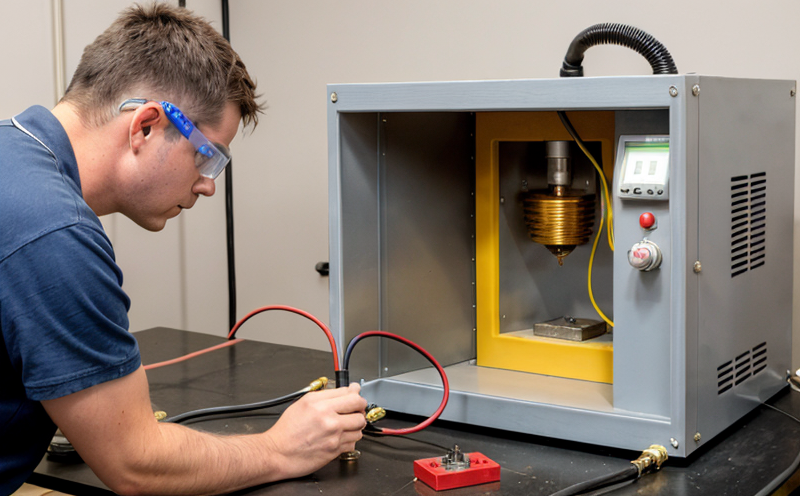ASTM A773 Magnetic Properties of Soft Magnetic Alloys
The ASTM A773 standard is a critical tool in the metallurgy and material testing sector. It specifies procedures for measuring the magnetic properties, including coercivity (Hc), remanent induction (Br), and maximum permeability (μmax) of soft magnetic alloys. These measurements are essential for ensuring that materials meet the required specifications for applications such as transformers, relays, and electric motors.
The test procedure outlined in ASTM A773 involves several key steps. Specimens are prepared according to standard practices, typically by cutting from larger billets or casting blanks. The specimens must be free of defects and have dimensions suitable for the measurement of magnetic properties without interference.
Once prepared, the specimens undergo a series of tests using a vibrating sample magnetometer (VSM) or similar equipment designed to measure magnetic susceptibility. The Hc value is determined by applying an alternating field and measuring the hysteresis loop. Br is measured after demagnetizing the specimen in a reverse field, while μmax is calculated from the highest point on the hysteresis loop.
The precision of these measurements can be influenced by several factors, including the homogeneity of the magnetic properties within the specimen and the accuracy of the measuring equipment. Therefore, it is important to follow ASTM A773 guidelines closely to ensure accurate results.
Understanding the significance of these parameters in real-world applications helps to highlight their importance. For instance, Hc indicates a material's resistance to demagnetization, which is crucial for maintaining stability in magnetic devices like transformers and relays. Br represents the residual magnetism after demagnetization, affecting the overall efficiency of the device. μmax influences the saturation magnetization, impacting the performance of components under high-field conditions.
The ASTM A773 test is widely used across various industries, including automotive, aerospace, and electronics, where the reliability and performance of soft magnetic alloys are paramount. Compliance with this standard ensures that manufacturers can confidently produce materials that meet stringent quality control requirements.
Moreover, the data obtained from these tests can be used to optimize production processes. By identifying variations in Hc or Br values, producers can adjust their manufacturing techniques to achieve consistent performance across batches of material. This not only enhances product reliability but also reduces waste and improves overall efficiency.
In conclusion, ASTM A773 is a cornerstone for ensuring the quality and consistency of soft magnetic alloys used in numerous applications. Its rigorous testing procedures provide valuable insights into the magnetic properties of these materials, enabling manufacturers to meet stringent industry standards and improve their products' performance.
Why It Matters
The measurement of magnetic properties using ASTM A773 is vital for several reasons, particularly in industries that rely heavily on soft magnetic alloys. First, it ensures that the materials used meet precise specifications, which is crucial for maintaining product quality and reliability. This standard helps prevent failures in critical applications such as transformers and electric motors.
Second, compliance with ASTM A773 allows manufacturers to demonstrate their adherence to industry best practices. This can be particularly advantageous when dealing with international clients or regulatory bodies that require proof of conformance to specific standards.
Third, the data generated from these tests can inform ongoing research and development efforts. By understanding how changes in processing conditions affect magnetic properties, researchers can develop new alloys or improve existing ones, leading to innovations in technology and performance.
Finally, ASTM A773 plays a key role in ensuring that suppliers meet their contractual obligations. It provides a standardized method for testing materials, which helps prevent disputes over material quality and ensures mutual trust between buyers and sellers.
Applied Standards
The ASTM A773 standard is closely aligned with other international standards such as ISO 15649-2 and EN 387. These standards provide additional guidance on the measurement of magnetic properties, often expanding upon the scope or providing supplementary methods for specific applications.
ASTM A773 specifically focuses on soft magnetic alloys, which are characterized by their ability to be magnetized easily but retain only a small fraction of the magnetization after removal of an external field. This behavior makes them ideal for use in devices where high permeability and low coercivity are required.
The standard specifies several key parameters:
- Coercivity (Hc)
- Remanent Induction (Br)
- Maximum Permeability (μmax)
The application of these standards in various industries ensures that products meet the necessary requirements for performance, reliability, and safety. By adhering to these standards, manufacturers can ensure that their materials are suitable for use in demanding environments.
Why Choose This Test
Selecting ASTM A773 Magnetic Properties of Soft Magnetic Alloys testing is advantageous for several reasons. Firstly, it offers a robust and reliable method for assessing the magnetic properties of soft magnetic alloys. The precision and accuracy of these tests are critical in ensuring that materials meet stringent quality control requirements.
Secondly, compliance with ASTM A773 can enhance your reputation as a trustworthy supplier or manufacturer. Many clients and regulatory bodies require proof of conformance to specific standards, making adherence to this standard an attractive selling point.
Thirdly, the data obtained from these tests can drive continuous improvement in production processes. By identifying variations in magnetic properties, producers can refine their manufacturing techniques to achieve consistent performance across batches of material. This not only enhances product reliability but also reduces waste and improves overall efficiency.
Forth, ASTM A773 testing supports innovation by providing a standardized method for evaluating materials. Researchers can use this data to develop new alloys or improve existing ones, leading to advancements in technology and performance.
Lastly, selecting this test ensures that suppliers meet their contractual obligations. The standard provides a clear and objective method for testing materials, which helps prevent disputes over material quality and fosters mutual trust between buyers and sellers.





